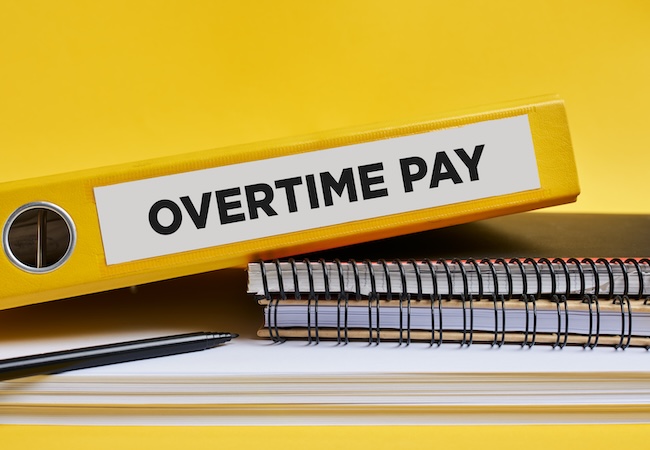Unpaid Overtime Lawyer: Your Partner in Fair Compensation with The Money Team Law Firm
Wage theft through unpaid overtime is a pervasive issue affecting employees across industries. At The Money Team Law Firm, we believe every employee deserves to be fairly compensated for their hard work. If you’ve been denied overtime pay or suspect your employer has violated wage and hour laws, our dedicated unpaid overtime attorneys are here to help.
With extensive experience handling unpaid overtime cases, we are committed to protecting your rights, holding employers accountable, and recovering the wages you’ve rightfully earned.
Understanding Overtime Laws
What Is Unpaid Overtime?
Unpaid overtime occurs when employers fail to compensate eligible employees for hours worked beyond 40 in a workweek at the federally mandated rate of one-and-a-half times their regular pay. Violations often stem from misclassification, off-the-clock work, or improper payroll calculations.
Federal overtime laws are governed by the Fair Labor Standards Act (FLSA), which establishes the minimum wage, overtime pay standards, and employee classifications. Additionally, many states have their own overtime laws that provide even greater protections.
Our unpaid overtime lawyers are well-versed in both federal and state laws, ensuring that your case is handled with the expertise it deserves.
Fair Labor Standards Act (FLSA)
The FLSA mandates that most employees who work over 40 hours in a week must be compensated at one-and-a-half times their regular hourly rate. This applies to non-exempt employees, including those in roles like retail, hospitality, healthcare, and more. However, misclassification or employer negligence often leads to unpaid wages.
At The Money Team Law Firm, we specialize in handling unpaid overtime claims under the FLSA and ensuring employers comply with its provisions.
State-Specific Overtime Laws
State laws often go beyond the protections offered by the FLSA. For instance, California requires overtime pay for hours worked over eight in a day, while New York enforces stricter penalties for wage theft. Understanding the nuances of these laws is critical to building a strong unpaid overtime case.
Our team of unpaid overtime attorneys is experienced in navigating both federal and state regulations to maximize your recovery.
Common Overtime Violations
Misclassification of Employees
Employers frequently misclassify workers as “exempt” from overtime pay to avoid additional labor costs. Common examples include labeling employees as independent contractors, salaried professionals, or managers without meeting the legal criteria.
Our unpaid overtime lawyers conduct thorough investigations to determine whether misclassification has occurred, ensuring you receive the wages you’re entitled to.
Off-the-Clock Work
Employees often perform tasks before or after their scheduled shifts without being compensated, such as preparing equipment, answering emails, or cleaning workstations. Employers are legally required to pay for all hours worked, even if these hours are not formally logged.
If your employer has encouraged or required off-the-clock work, our unpaid overtime attorneys can help you recover your rightful wages.
Improper Calculation of Overtime Pay
Overtime pay must be calculated based on the total compensation, including hourly wages, bonuses, and commissions. Some employers fail to include these additional earnings, resulting in underpaid overtime.
At The Money Team Law Firm, we have the tools to audit payroll records, identify discrepancies, and build a strong unpaid overtime claim on your behalf.
Automatic Meal Break Deductions
Employers sometimes deduct time for meal breaks even when employees work through their breaks. These unauthorized deductions result in lost wages and can be challenged in an unpaid overtime case.
Our team is skilled at uncovering these practices and holding employers accountable for every dollar owed.
Identifying Exempt vs. Non-Exempt Employees
Understanding whether you are eligible for overtime pay is critical.
Exempt Employees
Certain roles, such as executive, administrative, or professional positions, may be exempt from overtime pay under the FLSA. However, these exemptions have strict criteria, and many employers misuse them to avoid paying overtime.
Non-Exempt Employees
Most hourly workers and many salaried employees are considered non-exempt, meaning they are entitled to overtime pay for hours worked over 40 in a week. Our unpaid overtime lawyers ensure that employees are correctly classified and receive the compensation they’re owed.
Steps to Take if You Suspect Unpaid Overtime
If you believe your employer has failed to compensate you for overtime hours, acting promptly and strategically is essential to protect your rights and build a strong case. Employers may not willingly admit to wage violations, so gathering evidence and following the proper steps will ensure you have the strongest claim possible. Below is a detailed guide on what to do if you suspect unpaid overtime:
Document Hours Worked
Keeping a meticulous record of your work hours is one of the most critical steps in addressing unpaid overtime. Accurate documentation can help establish your claim and counter any disputes raised by your employer.
- Track Hours Daily: Record the time you start and finish work, including breaks and any tasks completed outside of scheduled hours (e.g., answering emails after hours, preparing for the next workday).
- Detail Tasks Performed: Note the specific tasks you were assigned during the hours in question. This can provide context to your claim and help demonstrate that the work performed was essential and authorized.
- Save Communications: Keep copies of emails, text messages, or any other correspondence related to your schedule, tasks, or employer expectations. For example, if your manager regularly assigns work outside of your scheduled hours, this can be strong evidence of unpaid overtime.
- Retain Pay Stubs and Schedules: Compare your recorded hours with your pay stubs and official work schedules to identify discrepancies.
By maintaining thorough records, you create a solid foundation for your unpaid overtime case and make it easier for your attorney to advocate on your behalf.
Report Internally
Before escalating the issue legally, consider addressing the matter through your employer’s internal channels. This approach demonstrates good faith and gives the employer an opportunity to correct the oversight.
- Speak to Your Supervisor: Raise the issue with your immediate supervisor or manager in a professional and constructive manner. Present your documentation and express your concerns about unpaid overtime.
- Contact Human Resources: If your supervisor is unresponsive or unhelpful, escalate the issue to your company’s HR department. HR professionals are trained to handle wage disputes and can investigate your claim.
- Request Written Confirmation: Ask for written responses to your concerns. This provides a record of your attempts to resolve the issue internally and can be valuable if legal action becomes necessary.
If internal reporting does not lead to a resolution, or if you experience retaliation for raising the issue, it’s time to seek legal assistance.
Consult an Attorney
If your employer denies your claim or fails to take corrective action, consulting an experienced unpaid overtime attorney is the next critical step. A skilled attorney will evaluate your case, identify violations, and guide you through the legal process.
- Case Evaluation: Your attorney will review your documentation, pay records, and any correspondence with your employer to determine the strength of your case.
- Investigating Employer Practices: Attorneys often uncover systemic issues, such as company-wide policies that result in unpaid overtime for multiple employees.
- Filing a Claim: Depending on the circumstances, your attorney may file a claim with the U.S. Department of Labor (DOL), pursue a private lawsuit, or join a collective action with other affected employees.
By involving a legal expert, you ensure your rights are protected, and you gain the best chance of recovering the wages you’re owed.
Legal Remedies for Unpaid Overtime
When pursuing an unpaid overtime claim, the law provides several remedies to ensure you are made whole for the financial losses and harm caused by your employer’s actions. Here’s a detailed breakdown of the available remedies:
Recovery of Unpaid Wages
The cornerstone of any unpaid overtime case is the recovery of back pay. Employees are entitled to receive compensation for all hours worked beyond 40 in a workweek, calculated at one-and-a-half times their regular pay rate.
- Comprehensive Back Pay: This includes unpaid overtime from the date the violation began until it was corrected. If your employer consistently failed to compensate you for overtime, the total amount could be substantial.
- Correct Calculation: Back pay should also include bonuses, commissions, and other earnings that contribute to your total compensation, ensuring the overtime rate is calculated accurately.
Our unpaid overtime lawyers meticulously review payroll records to ensure you recover every dollar owed.
Liquidated Damages
In cases where an employer’s violation of overtime laws is deemed willful, courts often award liquidated damages. These damages are designed to penalize the employer and compensate the employee further for the harm caused.
- Equal to Unpaid Wages: Liquidated damages are typically equal to the amount of unpaid wages, effectively doubling the total compensation owed.
- Proving Willful Violations: Employers who knowingly violated overtime laws or acted with reckless disregard for legal requirements are subject to these penalties.
Our attorneys are experienced in demonstrating willful violations, ensuring you receive the maximum compensation allowed by law.
Attorney’s Fees and Costs
One of the significant benefits of pursuing an unpaid overtime claim is the possibility of recovering attorney’s fees and court costs. This ensures that employees can seek justice without worrying about the financial burden of legal representation.
- Fee Reimbursement: Employers may be required to cover the cost of your attorney’s services, filing fees, and other related expenses.
- Access to Justice: By eliminating financial barriers, these provisions encourage employees to assert their rights and hold employers accountable.
At The Money Team Law Firm, we work on a contingency basis, meaning you pay nothing upfront. We only collect fees if we win your case, providing peace of mind as you seek the wages you’re owed.
Additional Remedies
In some cases, courts may impose additional penalties or award damages for emotional distress caused by wage theft. For instance, if your employer retaliated against you for raising concerns about unpaid overtime, you could recover compensation for related harm.
How The Money Team Law Firm Can Help
At The Money Team Law Firm, we are committed to helping employees navigate the complexities of wage and hour disputes. From documenting violations to recovering unpaid wages and securing liquidated damages, our unpaid overtime attorneys provide comprehensive legal support.
If you believe your employer has failed to pay you for overtime hours, don’t wait. Contact us today for a free consultation and let us fight to recover the compensation you deserve. Your time and effort matter—let us ensure you’re paid fairly for the work you’ve done.
Statute of Limitations
Federal law imposes a two-year statute of limitations for unpaid overtime claims under the FLSA, with an extension to three years for willful violations. State laws may have different timeframes, making it essential to act promptly.
At The Money Team Law Firm, we ensure your unpaid overtime case is filed within the applicable deadlines, safeguarding your right to recovery.
Class and Collective Actions
In many cases, multiple employees are affected by the same wage violations. Joining a class or collective action can strengthen your claim and lead to broader accountability for employers.
Our unpaid overtime lawyers have extensive experience representing groups of employees in collective actions, ensuring all affected individuals receive fair compensation.
Employer Retaliation Protections
Federal and state laws protect employees from retaliation when asserting their rights. If your employer has demoted, harassed, or fired you for pursuing an unpaid overtime claim, we can help you file additional claims for damages.
Frequently Asked Questions About Unpaid Overtime
What is unpaid overtime?
Unpaid overtime occurs when an employer fails to compensate eligible employees for hours worked beyond 40 in a workweek at the required rate of one-and-a-half times their regular pay. This often results from practices such as misclassifying employees as exempt, requiring off-the-clock work, or making improper payroll deductions. If you believe your overtime wages have not been paid, an unpaid overtime attorney can help you determine your rights and recover what you’re owed.
How do I know if I’m eligible for overtime pay?
Eligibility for overtime pay depends on whether you are classified as a non-exempt employee under the Fair Labor Standards Act (FLSA). Most hourly workers and some salaried employees are entitled to overtime compensation. Exempt employees, such as certain executives, professionals, and administrative workers, are not eligible. If you’re unsure of your classification, an unpaid overtime lawyer can review your employment situation and advise you accordingly.
What should I do if my employer refuses to pay overtime?
If your employer denies you overtime pay, start by documenting your hours worked, including any tasks performed outside of your scheduled shifts. Report the issue to your HR department or supervisor to attempt an internal resolution. If the issue remains unresolved, consult an experienced unpaid overtime attorney who can help you file a legal claim to recover your wages.
How are overtime wages calculated?
Overtime pay is calculated at one-and-a-half times your regular hourly rate for every hour worked over 40 in a single workweek. Your regular rate includes hourly wages and additional earnings such as commissions, bonuses, or shift differentials. Miscalculating this rate is a common violation, and an unpaid overtime lawyer can ensure your wages are properly calculated and recovered.
Can salaried employees receive overtime pay?
Yes, some salaried employees are eligible for overtime pay if they meet the criteria for non-exempt status under the FLSA. The law looks at job duties and salary thresholds, not just whether you are paid on a salary basis. If your employer incorrectly classifies you as exempt, you may still have a valid unpaid overtime claim.
What are the common signs of unpaid overtime violations?
Common indicators of unpaid overtime violations include being asked to work off the clock, seeing unexplained deductions from your paycheck, or being denied overtime pay due to misclassification. If you’ve experienced these or other unfair practices, consulting an unpaid overtime attorney is crucial to understanding your rights.
How long do I have to file an unpaid overtime claim?
The statute of limitations for filing an unpaid overtime claim under the FLSA is typically two years, but it can be extended to three years for willful violations. State laws may have different deadlines, so acting quickly is essential. Contacting an unpaid overtime lawyer ensures your claim is filed within the required timeframe.
Can I file a claim if other employees are also affected?
Yes, if multiple employees are experiencing similar wage violations, you may be able to join or initiate a collective action under the FLSA. This allows employees to combine their claims and seek compensation together. An experienced unpaid overtime attorney can guide you through the process of participating in a collective action.
What can I recover in an unpaid overtime claim?
Employees who successfully prove unpaid overtime claims may recover back pay for all hours worked, liquidated damages equal to the unpaid wages in cases of willful violations, and attorney’s fees and court costs. These remedies ensure you are compensated fully and fairly for the harm caused by your employer’s actions.
Can my employer retaliate against me for filing an overtime claim?
No, federal and state laws prohibit employers from retaliating against employees who assert their rights to overtime pay. Retaliation can include termination, demotion, harassment, or other adverse actions. If you face retaliation, an unpaid overtime attorney can help you file additional claims to seek damages and hold your employer accountable.
Why Choose The Money Team Law Firm?
At The Money Team Law Firm, we bring unparalleled experience, personalized service, and a relentless commitment to justice:
- Proven Track Record: We’ve successfully recovered millions for employees in unpaid overtime cases.
- Client-Focused Representation: We prioritize open communication, ensuring you feel supported and informed throughout the process.
- No Upfront Costs: We work on a contingency basis, so you pay nothing unless we win your case.
Take Action Today with The Money Team Law Firm
Your time and effort deserve to be valued and fairly compensated. If you’ve been denied overtime pay or suspect your employer has violated wage and hour laws, it’s time to take a stand. At The Money Team Law Firm, our dedicated unpaid overtime attorneys are here to protect your rights, recover your hard-earned wages, and hold employers accountable for their actions.
Don’t wait. Your claim may be subject to strict deadlines. Acting now ensures your case is filed on time and increases the likelihood of recovering what you’re owed. When you work with us, you gain the support of a team that will guide you through every step of the process—from documenting violations to negotiating settlements or litigating in court.
We offer a free, no-obligation consultation, so you can get the answers you need without financial risk. Whether you’ve been misclassified, asked to work off the clock, or underpaid for overtime hours, we’re here to help you take control of your situation and secure the compensation you deserve.
Contact The Money Team Law Firm today to speak with an experienced unpaid overtime lawyer. Your hard work deserves justice, and we’re here to deliver it.
Call now or fill out our online form to get started—your future begins with fair pay and a team that truly fights for you.









